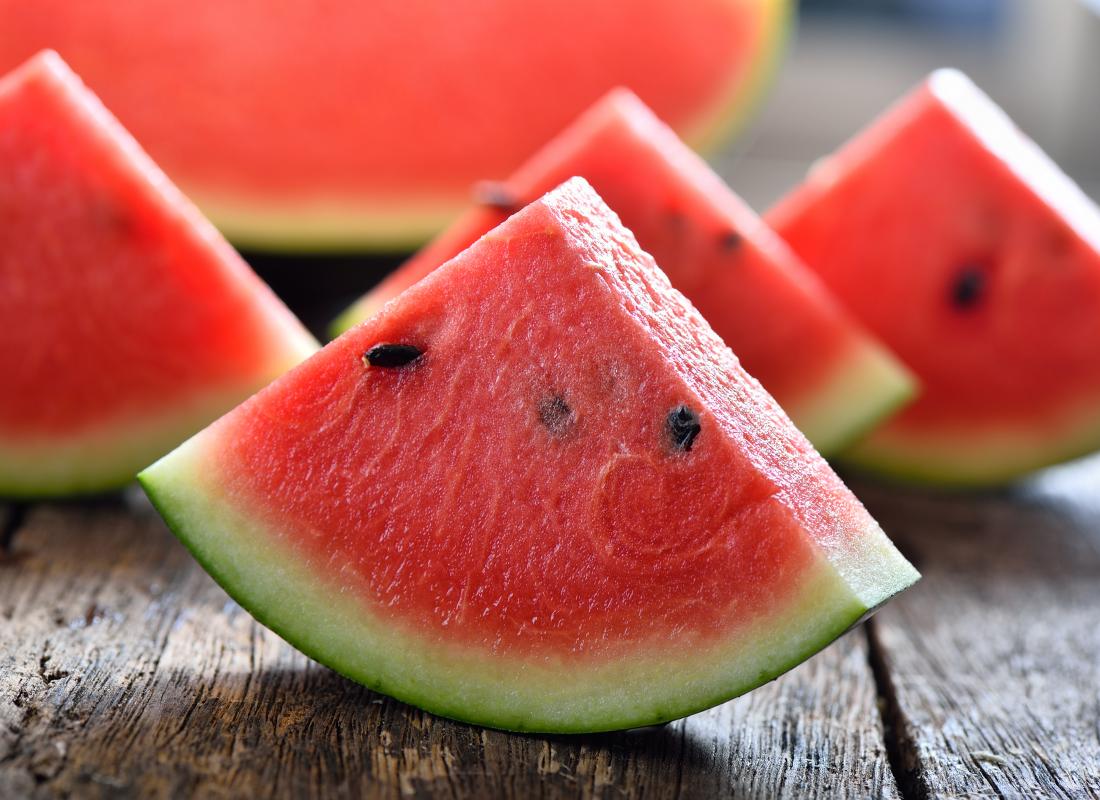Watermelons (Citrullus lanatus) are mostly water — about 92 percent — but this refreshing fruit is soaked with nutrients. It is considered as both a vegetable and a fruit. Watermelon contains about 92% water and 6% sugar. There are over 500 varieties of watermelon in the world!
Here in Guyana, watermelon can be found at various stalls, markets and supermarkets. It is used as a healthy snack.
Watermelon Is A Fruit
Like the pepper, tomato, and pumpkin, watermelon is a fruit, botanically. It is the fruit of a plant originally from a vine of southern Africa. Loosely considered a type of melon (although not in the genus Cucumis), watermelon has a smooth exterior rind and a juicy, sweet interior flesh.
Watermelon Is A Vegetable
Watermelon is a member of the cucurbitaceae plant family of gourds (classified as Citrullus lantus), related to the cucumber, squash, and pumpkin (Maynard, 2001). It is planted from seeds or seedlings, harvested, and then cleared from the field like other vegetables.
Origin Of Watermelon
Watermelon is a fruit that grows on a vine-like flowering plant native to Southern Africa. It was cultivated in the Nile River Valley, in Egypt, and eventually in China, roughly 1,000 years ago. China is considered as the largest producer of Watermelon in the world. Today, watermelon is cultivated worldwide.
Description Of Watermelon
Watermelon is a creeping herbaceous vine that roots in the ground and grows up to 10 m or 32.8 ft long. The vine has alternate and large leaves which measures up to 60-200 mm long; 40-150 mm wide and pinnately lobed. The flowers are axillary, yellow or green and measures up to 1.5 cm long. The plants have fruit up to 1.5-20 cm (0.59-7.87 inches) in diameter which is rounded or oblong or sub globose. The flesh is deep red, pink, orange, yellow or white. It contains dull brown or black seeds that are flattened. The fruit usually weighs up to 20 kg or more.
Types Of Watermelon
- Seedless Watermelon – These watermelons were first introduced into the market in the 1990s, as a customized modification of fruits and vegetables became popular. Seedless watermelons do actually possess underdeveloped seeds, contrary to the name, but they are edible. Typically growing from 10-20 pounds and taking just under three months to mature, some of the most common varieties of seedless watermelon include Millionaire, Nova, Crimson, and Queen of Hearts watermelons.
- Picnic Watermelon – A picnic watermelon is a traditional watermelon you think of at a summer barbecue, with a green, striped rind, and a reddish-pink interior with plenty of sweet juice. The weight of these watermelons ranges from 14-45 pounds and mature in just under three months.
- Icebox Watermelon – These much smaller watermelons normally range from 5-15 pounds, and are intended for personal consumption, or shared between a few friends. The dark green rind and dense fruit are unmistakable, and they also mature in a shorter time – about 75 days. Two popular types of icebox watermelon are Tiger Baby and Sugar Baby watermelons.
- Yellow/Orange Watermelon – These watermelons have a surprising interior color, although their exterior may look like a picnic watermelon. Inside, the yellow and orange color are due to a difference in antioxidant content – orange and yellow varieties have more beta-carotene than lycopene. These watermelons tend to take about 75 days to mature and come in both seedless and seeded varieties. Common types of these watermelons include Yellow Baby and Desert Gold watermelons.
How Watermelon Is Used As A Fruit Or A Vegetable
Watermelon is popularly used as a fruit, to be a sweet enhancer or fun accompaniment to everyday meals. Like other fruits, it is commonly cubed, balled, sliced and enjoyed fresh.
In places like China, the outer rind of the watermelon is used as a vegetable – stir-fried, stewed and often pickled. Pickled watermelon rind also is widespread in Russia, not to mention in the southern United States
11 Healthy Benefits Of Watermelon
- Viagra effect – Lycopene and Beta carotene is found in the watermelons that helps to relax the blood vessels. Citrulline converts into arginine when the Watermelon is consumed. Arginine is helpful for the circulatory system and heart that also helps to maintain the immune health. Arginine enhances nitric oxide that helps to relax the blood vessels and also prevents erectile dysfunction. It cures high blood pressure, angina and other cardiovascular ailments. It also eliminates the toxic compounds from the bodies. It contains lycopene which is an antioxidant that protects the prostate, skin and heart health.
- Relieves muscle soreness – Watermelon possesses antioxidant properties that help to raise the muscle protein and promote the athletic performance. The study shows that watermelon is rich in L-citrulline which helps to provide relief from the muscle soreness. The study found that the natural juice containing natural juice seems to be bioavailable.
- Lowers blood pressure – Watermelon helps to lower the blood pressure on the heart and aorta. The people with high blood pressure and obesity are at high chances of heart attack or stroke when they are exposed to the cold during the winter months. The study shows that Watermelon is helpful for the vascular parameters and aortic blood pressure.
- Lowers aortic blood pressure – Watermelon possesses vasodilator properties that help to prevent hypertension which is the major chances for strokes and heart attacks. Watermelon is rich in L-citrulline which is associated with L-arginine that is an amino acid essential to form nitric oxide required to regulate blood pressure and vascular tone. Watermelon is rich in Vitamin C, B6, A and lycopene which is a powerful antioxidant that helps to lower the glucose level of serum.
- Treats health ailments – The research shows that the people who drank watermelon juice their blood levels of arginine was 11 percent and 18 percent more in comparison to those who did not drank the watermelon juice. The study shows that arginine helps to cure the unhealthy level of blood sugar, high blood pressure and vascular ailments related with sickle cell disease.
- Reduce atherosclerosis – The study conducted on mice shows that those who drank watermelon juice instead of water have low body weight due to the reduction in fat mass. The concentration of plasma cholesterol and atherosclerotic lesions was reduced. Melon provides various health benefits. The study is still going on to find out the bioactive compounds that help to enhance the human health.
- Prostate health – High amount of lycopene is found in Watermelon which is an antioxidant that helps to eliminate the prostate cancer. There is a specific relationship between the prevention of cancer and lycopene. The diuretic properties found in Watermelon make the health of urinary tract effective.
- Kidney ailments – Watermelons are rich source of potassium that helps to cleanse the toxic substances in kidney. It helps to reduce the uric acid concentration in the blood that helps to lower the risk of kidney damage and forms the renal calculi. It promotes the urination that helps to clean the kidneys due to the high water content. The antioxidants found in Watermelon promote the kidney health and lowers the signs of premature aging such as age spots and wrinkles.
- Prevent cancer – Watermelons have high concentration of lycopene which is a carotenoid phytonutrient that is associated with the prevention of cancer. The study shows that lycopene helps to reduce the chances of breast, lung, colon, prostate and endometrial cancer. It also contains Vitamin C which is an antioxidant and serves great anti-cancer activities.
- Eye ailments – The adequate intake of Watermelon helps to lower the chances of macular degeneration and eye problems due to the presence of Vitamin C, zeaxanthin, lutein and beta carotene. It promotes the eye health by delaying the chances of age related blindness as well as degeneration. These antioxidants prevent drying up of eyes, optical nerves and glaucoma.
- Cures impotence – Watermelon contains arginine that helps to cure erectile dysfunction and promotes the libido, lowers frigidity.
Uses Of Watermelon Worldwide
- The fruit is consumed raw as a refreshing drink.
- Unripe fruits are added to the soups.
- The fruits are used to make jams
- Seed are consumed raw or cooked.
- The roasted seeds are used with cereal flours to make cakes, bread etc.
- It is also added to make stews or soups.
- It is added to the fruit salads by making cubes or sections.
- It could be made into jam, fruit cocktail, sorbet and juice.
- The seeds are roasted and eaten as a snack in some Asian countries.
- In China, rinds are stewed or stir-fried.
- In South, it is used in form of pickles.
- In Asian countries, the seeds are roasted and consumed as a snack food.
- Watermelon could be mixed with salt, red onion (thinly sliced) and black pepper
Interesting Facts About Watermelon
- It belongs to the same family of pumpkin, cucumber and squash.
- The watermelon is the official state vegetable of Oklahoma.
- Due to the rich electrolyte and water content, it is regarded as the thirst quenchers.
- Watermelon contains Vitamin C, B1 and manganese that helps to prevent from infections.
- China is largest producer and Turkey is the second largest producer of Watermelon in the world.
- In China, rinds are stewed, stir-fried or pickled and also used as a vegetable.
- There are above 1200 varieties of Watermelon which is available in different weights, sizes, shapes and color such as red, yellow, orange or white.
- The weight of the heaviest watermelon is 121.93 kg or 268.8 lb.
- Watermelon contains more lycopene in comparison to the raw tomatoes.
- The juice of Watermelon may provide relief from muscle soreness.
- Watermelon doesn’t contain any cholesterol or fat and rich in fiber, Vitamins C & A and potassium.
- Watermelon is cultivated over 96 countries in the world.
- In Egypt and Israel, Watermelon is paired with feta cheese.
- Even the rinds and seeds of Watermelon are edible.
About Watermelon
Watermelon (Citrullus lanatus) is considered as both a vegetable and a fruit. It contains about 92% water and 6% sugar. There are over 500 varieties of watermelon in the world! There are four types of watermelon. It originated in South Africa but today is being cultivated worldwide. In Guyana, it is being sold at various stalls, markets and supermarkets and is used as a healthy snack, in salads and to make juice. Watermelon is also packed with amazing health benefits.
Article References:
- https://en.wikipedia.org/wiki/Watermelon
- https://www.watermelon.org/Watermelon-101
- https://www.healthbenefitstimes.com/health-benefits-of-watermelon/








1 Comment